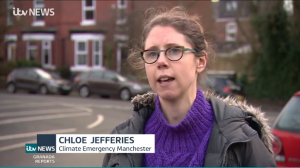One of our CEM colleagues Chloe was invited onto “Granada Reports”, to talk about the Greater Manchester Clean Air Zone. (third video down)

As ever with complex issues like this, there are more angles to consider than can fit into a short segment for a TV news interview. So here are all the points we would have liked to have made, given the chance:
- Clean air zones (CAZ) are necessary – Air pollution kills people, and harms development of young lungs, increasing risk of other health issues later in life.
- Doing a CAZ right is a matter of a “just transition”, i.e. ensuring that those who are negatively affected are given proper support. Both the Government and GMCA have tried to pass the buck – local authorities have been legally directed by central government who have been ordered by the UK Supreme Court to improve air quality, but the councils and GMCA don’t really have the resources to do all the things that would really be needed.
- The amount of money put towards the GM vehicle upgrade fund (£120M) is a tiny amount of money when set in the context of overall government spending, especially when we think of how much has been spent on COVID. It is a political choice not to prioritise clean air, health and premature death over the polluting status quo.
- Public engagement on the benefits and necessity of a CAZ has been close to non-existent, so a backlash from those it will affect economically is not surprising – and indeed was always to be expected. Another CEM colleague, Simon, was having a chat with a neighbour who’s a builder. It went along the lines of “I need my van for my work, to pay my bills and feed my children”. We can’t set ourselves against that or persuade someone to change from that argument head on. We need far better engagement to understand the basic needs (for a business) of these vehicles and then offer up alternatives to what will probably be a very expensive EV. But if an EV is the only option, then the funding needs to be there to support businesses making the transition.
- The lack of progress on the Bee Network and relatively poor public transport provision in the region mean that people don’t have a lot of other choices, especially when compared to a city like London, with the best public transport in the UK. Once again we see the North being left behind despite the so-called “levelling up” agenda – political choices put money ahead of health.
- We need bravery from local and national leadership. There is no painless way to do this – we’ve been putting off meaningful action on this for decades. There is a desperate need for leadership and a willingness to say, if we want to breathe clean air in towns and cities, it’s going to involve some genuinely difficult changes. Of course there also needs to be the willingness to devote serious, sustained resources to all aspects of this sort of change – public engagement, infrastructure, vehicle upgrades and research into / trialling of alternatives to universal use of motor vehicles – and to have a long term plan that people can see is being executed against. If this can be achieved however, experience from other cities is that opposition to similar measures drops dramatically when people can see and experience the benefits (see for instance the success of the York unmandated CAZ, Birmingham CAZ including private vehicles is just starting but opposition dropping, or “Vision Zero” in Oslo)
We’re going to be talking more about climate change and how it affects our health on Tuesday 8th Feb from 7pm and you can register via Eventbrite here
